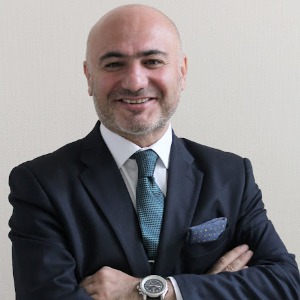Federico Benetti, Benetti Foundation, Argentina
Between 1970 and 1980 there were experiences and series of patients operated on Direct Coronary Surgery without the use of extracorporeal circulation. During the 80 and 90 the Technique was developed. The MIDCAB was the one that promoted the development of Coronary Surgery withou [....] » Read More















Title : Fats of Life, the skinny on statins and beyond !
Ahdy Wadie Helmy, Indiana University School of Medicine, United States
With Cardiovascular disease still the primary killer of adults globally,tackling lipid disorders has proven extremely useful from the statins experience since the early nineties. However,goals are not met regarding the lipid parameters for the vast majority of the world adult pop [....] » Read More
Title : Study of pathological cardiac hypertrophy regression
Shuping Zhong, University of Southern California, United States
Heart disease ranks as the first leading cause of death in west countries. No matter pulmonary heart disease or cardiogenic heart disease, heart disease ultimately lead to pathological cardiac hypertrophy (PCH). PCH is an irreversible, high-risk and common cardiomyopathy, an [....] » Read More
Title : Novel ways of cardiovascular risk assessment
Syed Raza, Awali Hospital, Bahrain
Cardiovascular disease (CVD) is the leading cause of death and disability worldwide. The primary prevention of CVD is dependent upon the ability to identify high-risk individuals long before the development of overt events. This highlights the need for accurate risk stratificatio [....] » Read More
Title : Personalized and Precision Medicine (PPM) and PPN-guided cardiology practice as a unique model via translational applications and upgraded business modeling to secure human healthcare, wellness and biosafety
Sergey Suchkov, N. D. Zelinskii Institute for Organic Chemistry of the Russian Academy of Sciences, Russian Federation
A new systems approach to diseased states and wellness result in a new branch in the healthcare services, namely, Personalized and Precision Medicine (PPM). The pace of inno-vation in Personalized & Precision Cardiology (PPC) is thus becoming fast including: The success [....] » Read More
Title : Pharmacological advancement in pulmonary arterial hypertension treatment - Contribution of treprostinil dry-powder formulation
Miroslav Radenkovic, University of Belgrade, Serbia
Pulmonary Arterial Hypertension (PAH) is still a devastating illness with substantial morbidity and death outcomes. Taking into account that the disease advances quickly for many patients, and is commonly associated with severe clinical symptoms, new treatment options are still r [....] » Read More
Title : Cardiovascular nanomedicine: Stopping strokes, unclogging arteries and restoring heart function
Thomas J Webster, Hebei University of Technology, China
Nanomedicine, or the use of materials with at least one dimension less than 100 nm, has led to improved disease prevention, diagnosis, and treatment. This talk will cover recent advances in the use of nanomaterials to prevent, diagnose, and treat cardiovascular diseases. Specific [....] » Read More
Title : Antibodies with functionality as a new generation of translational tools designed to monitor autoimmune myocarditis at clinical and subclinical stages
Sergey Suchkov, N. D. Zelinskii Institute for Organic Chemistry of the Russian Academy of Sciences, Russian Federation
Catalytic Abs (catAbs) are multivalent Immunoglobulins (Igs) with a capacity to hydrolyze the Antigenic (Ag) substrate. In this sense, proteolytic Abs (Ab-proteases) represent Abs to pro-vide proteolytic effects. Abs against Cardiac Myosin (CM) with proteolytic activity exhibitin [....] » Read More
Title : A fitting pipeline to reproduce the dynamic of high complexity electrophysiology models
Hector Velasco Perez, KU Leuven, Belgium
In the last 30 years, people have devoted great efforts to generate models that reproduce the electrophysiological complexity of patient hearts. These models are referred to as digital twins and require a large number of parameters to be calibrated through experimental data and c [....] » Read More
Title : An Uncommon case of pericarditis after transcatheter aortic valve replacement: The first reported case in Korea
Yu Jin Chung, Konkuk University Hospital, Korea, Democratic People's Republic of
Although transcatheter aortic valve replacement (TAVR) has become a favorable option for severe aortic stenosis in older patients, post-procedural complications still exist. Commonly known complications include paravalvular leakage, vascular injury, stroke, and conduction abnorma [....] » Read More
Title : Diagnosis and treatment of primary cardiac lymphoma in an immunocompetent 27 year old man
Moataz Taha Mahmoud, Madinah Cardiac Center, Saudi Arabia
Background: Primary cardiac lymphomas (PCL) represent extremely rare cardiac tumors which are accompanied by poor prognosis, unless they are timely diagnosed and treated. Despite the rarity of Primary cardiac lymphomas, they should always be kept in mind in the differential [....] » Read More
Title : Subclinical left ventricular dysfunction in patients with active systemic lupus erythematosus – a speckle tracking echocardiography study with follow-up
Moataz Taha Mahmoud, Madinah Cardiac Center, Saudi Arabia
Background: Cardiovascular disease is a major cause of morbidity and mortality in systemic lupus erythematosus (SLE) patients. The detection of myocardial involvement in patients with SLE is difficult since clinical symptoms and signs are nonspecific, and myocardial involvement m [....] » Read More
Title : Perception of cardiovascular risk in women after a rehabilitation program
Maria Teresa Carvallo Marin, University of Chile, Chile
Evaluacion de la percepcion de riesgo cardiovascular en mujeres.Carvallo M.T.et al.Perception of cardiovascular risk in women after a rehabilitation program Introduction: After suffering a serious car- diovascular event (CV), cardiac rehabilitation is a process in whi [....] » Read More
Title : Territory-resolved cardiac MRI feature-tracking strain enhances detection of obstructive coronary stenosis in hypertension
Wei Feng Yan, West China Hospital, China
Background: In patients with essential hypertension, left ventricular (LV) global strain reduction often reflects diffuse remodeling rather than focal ischemia, making it difficult to differentiate functional impairment caused by obstructive coronary artery stenosis (OCAS). This [....] » Read More
Title : Clinical status and experimental research progress in pathological myocardial hypertrophy
Liling Zheng, Fujian Medical University, China
Pathological Cardiac hypertrophy is a myocardial lesion caused by various etiologies, leading to organic changes in the heart, including abnormal myocardial contraction and electrocardiographic dysfunction. Pathologically, it manifests as inappropriate ventricular dilation or hyp [....] » Read More
Title : Determination of significant change in right ventricular strain among patients with rheumatic mitral stenosis after percutaneous transvenous mitral commissurotomy
Maria Antonette Bernal Gelindon, Philippine Heart Center, Philippines
Introduction: Application of strain echocardiography in Rheumatic Mitral Stenosis (MS) allows new insight in evaluation of cardiac function. The aim of this paper is to describe the significant change in right ventricular (RV) strain among patients with Rheumatic MS after Percuta [....] » Read More
Title : Transcatheter closure of aorto-left ventricular tunnel in a 25-day-old neonate
Hamid Amoozgar, Shiraz University of Medical Sciences, Iran (Islamic Republic of)
History and Physical Exam: A 25-day-old male neonate presented with feeding-associated fatigue, diaphoresis, and a cardiac murmur. Clinical evaluation suggested significant hemodynamic compromise, prompting further investigation. Imaging: Echocardiography revealed left ve [....] » Read More
Title : Finding and rehabilitation of absent or concealed pulmonary arteries through PDA stenting
Mohammadreza Edraki, Shiraz University of Medical Sciences, Iran (Islamic Republic of)
Purpose: Unilateral absence or occult a pulmonary artery is a well-known congenital heart disease, that may occur in isolation or with cardiac disorders like tetralogy of Fallot. CT angiography usually shows just a pulmonary artery and perhaps a closed PDA ampulla from the aort [....] » Read More
Title : A very rare case of cyanotic congenital heart disease
Nima Mehdizadegan, Shiraz University of Medical Sciences, Iran (Islamic Republic of)
A 4 years old girl with severe cyanosis and failure to thrive ,dyspnea on excertion suspicious to have hematologic disease. When i did visit the patient I have done the full echocardiography for her and the diagnosis was connection of superior vena cava to left atrial auricle .T [....] » Read More
Title : Advancing the care of heart failure and T2DM focus on updated guidelines
Osama Elmaraghi, Alexandria University, Egypt
Heart failure is a clinical syndrome caused by a structural and/or functional cardiac abnormality, resulting in a reduced cardiac output and/or elevated intracardiac pressures at rest or during stress.1 Heart failure poses a significant global disease burden, more than 60 mil [....] » Read More
Title : Should internet speed be a marker of social vulnerability? Insights from patients with ATTR cardiac amyloidosis
Rona Yu, Walter Reed National Military Medical Center, United States
Background: Socioeconomic disparities influence access to medical care and cardiovascular disease outcomes. While there is an increasing interest in internet-based tools to improve patient care, access to high-speed internet and its association with outcomes is poorly understood. [....] » Read More
Title : Deciphering the cardioprotective mechanism of a natural compound in post-infarct mice: an integrative approach combining network pharmacology, in vitro, and in vivo validation
Krishna Priya Jha, NIPER, India
Herbs have long served as foundational sources of medicinal agents and continue to play a pivotal role in both traditional and modern pharmaceutical practices. Among these, several naturally derived compounds exhibit promising therapeutic potential against cardiovascular diseases [....] » Read More
Title : Shock index as clinical independent predictor of in-hospital mortality in acute coronary syndrome patients: A 5-year retrospective study
Alfie F Calingacion, Vicente Sotto Memorial Medical Center, Philippines
Introduction/Objective: In the Philippines, acute coronary syndrome (ACS) is a leading cause of mortality. Risk assessment is crucial for estimating prognosis and indicating the need for a more aggressive approach. Shock index (SI), ratio of heart rate and systolic blood pressure [....] » Read More
Title : Functional and psychological impact of cardiac rehabilitation in patients with implantable cardiac devices: A longitudinal study
Carolina Castro Gomez, Fundacion Valle del Lili, Colombia
Background: Cardiac rehabilitation (CR) programs are established interventions for improving physical and psychological outcomes in patients with cardiovascular diseases. However, data on their effects in patients with cardiac implantable electronic devices (CIEDs), particularly [....] » Read More
Title : Global temporal trends and regional disparities in atrial fibrillation/flutter and tracheal, bronchus, and lung cancer among adolescents and young adults
Zeye Liu, Peking University, China
Background: Atrial fibrillation/flutter (AF/AFL) and tracheal, bronchus, and lung cancers (TBLC) represent growing public health challenges worldwide. While their epidemiology in older populations is well-documented, the patterns of co-occurrence, geographical variation, and [....] » Read More
Title : Application of AI in the detection of cardiovascular disease using multimodal imaging – a literature review
Karthikan Kirupakaran, Queen Mary University of London, United Kingdom
Background/Context: Cardiovascular disease (CVD) remains the leading cause of mortality worldwide and places a considerable burden on healthcare systems. Accurate and timely detection is vital for improving clinical outcomes, yet conventional imaging interpretation is limited by [....] » Read More
Title : Unique features of GFAP – expressing valve interstitial cells in valvular homeostasis and fibro-calcific aortic valve disease
Julia Bottner, Heart Center Leipzig, Germany
Background: The specialized three-layered microarchitecture of the aortic valve (AV) is designed to sustain extreme biomechanical forces throughout cardiac cycles. The extracellular matrix (ECM) of the AV’s inner layer, the spongiosa, mediates and absorbs mechanical forces [....] » Read More
Title : Mixed connective tissue disease revealed by MINOCA syndrome
Silini Enfal, Babeloued Hospital, Algeria
Introduction: Myocardial infarction with non-obstructive coronary arteries (MINOCA) is an increasingly recognized clinical entity, especially with the frequent use of angiography in acute coronary syndromes. Diagnosing MINOCA requires a thorough evaluation of multiple potent [....] » Read More